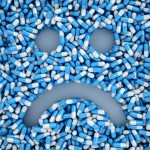
I don’t normally blog about non-English language publications, but this new evidence-based guideline from the Dutch College of General Practitioners caught my eye yesterday.
The guidance says that antidepressants should only be given as a first line treatment to people with severe depression and that those who only have depressive symptoms should be given a short course of psychotherapy and other help structuring their daily activities instead.
Over one million people in the Netherlands are prescribed antidepressants and the authors of the guideline say that this number is too high and GPs need help in telling the difference between depressive symptoms and severe depression.
The guidance is clear that a diagnosis of depression requires the presence for 2 weeks of at least 5 DSM-IV criteria, including one of two core symptoms: a depressed mood and loss of interest or pleasure in all activities for most of the day, every day.
It goes on to stress that this diagnosis of depression is quite different from the low mood and basic depressive symptoms that many people experience in their daily lives, as a natural reaction to loss or disappointment.
The guideline recommends antidepressant treatment from the outset only if the patient’s depression “is accompanied by severe suffering or social dysfunctioning or serious psychiatric comorbidity” such as anxiety or addiction.
It will be interesting to see the impact this guideline has on clinical practice. The authors have grand targets; hoping that the new approach will reduce antidepressant consumption by as much as 40%. GPs clearly face a difficult job in correctly diagnosing and treating people with depressive symptoms or severe depression, but this updated guidance suggests a new approach that may bear fruit if it is well implemented.
Links
NHG Standard Depression (second revision). Family Practice, Volume 2012, Number 6:252-259
[English language version via Google translate]

I think this is a very positive step but will be most unwelcome for the big pharmaceutical companies especially if other countries follow suite implement more guidance encouraging less indiscriminate and widespread prescription of these products. NICE also suggest that antidepressants shouldn’t be the first line of treatment for depression, perhaps because of the mounting evidence that they are little more effective than placebo and because of the host of unpleasant (depressing) side effects many of them carry.
Thanks for posting Andre.
Mark
Thanks Andre
I was a bit sweeping in my summation of The Nice Guidelines. I think NICE updated their guidelines quite recently.
All best wishes
Mark
Hi again Mental Elf
I think it just goes to show that we are all ‘individuals’ and ‘unique’. Using the words do not use antidepressants ‘routinely” for prescriptions is useful, because it differentiates between long-standing and low threshold difficulties.
I think that the main problem is that psychological and talking therapies, or any kind of creative outlet therapies would be helpful by choice for anyone experiencing depression, whether it is something new, or habitual in their lives. It may well be that no one has treated the condition successfully in the past, or it may be that the person has not even gone for help, knowing that it is mostly meds which are prescribed.
What I’d like to know is when these therapies will actually be available for people?
I would definitely recommend therapies, in the old fashioned sense as delivered by occupational therapists too, like creative artwork or music or dancing, etc as well. This is because psychological talking therapies do not suit everyone.
I have used journalling for recovery as my main creative outlet, and it works for me. I journal about all sorts of things including how I feel and what I do and how to keep well.
There is a lot more to life than just taking anti-depressant medication, as that is depressing in itself.
http://mbct.co.uk/about-mbct/
This is an interesting link to an article about what mindfulness is all about, and how it can help with depression, how the downward spiral pattern can be shifted and the benefits of mindfulness practice.
Also on the bipolar website is another interesting Beyond Meds article about the benefits of meditation and how it can increase brain size, and help heal the brain
http://beyondmeds.com/2012/06/22/antipsychotics-shrink-the-brain-but-meditation-is-found-to-increase-brain-size-heal-your-brain/
In other words there are alternatives to remaining solely or only on meds, which may do more harm than good. We need complementary treatments and alternatives to explore and find the ones which work for us.
In my experience,when working in an area of high socio-demographic need-depression and anxiety were overdiagnosed and antdepressants and therapies over prescibed.Masking the actual problem that triggered generations of hopelessnes,mainly unemployment and short term political thinking/planning.Leaving communites without hope and without political parties with the will to do anything about it. They instead relied on GP’s and therapists to manage their hopelessness,this in turn encouraged a sick role and further increased a sense of hopelessness.There is no doubt that some people do have severe depression and helping these people is a priority, but GP,s and therapists need to be wary that they are not perpetuating the myth that depression is on the increase and letting
the politicians of the hook.